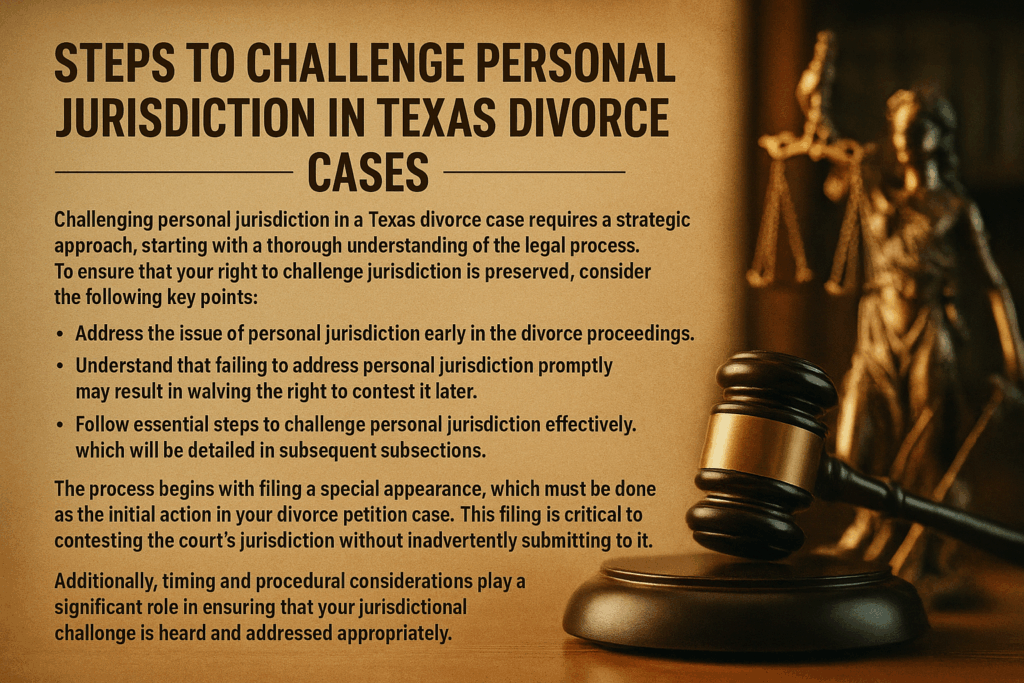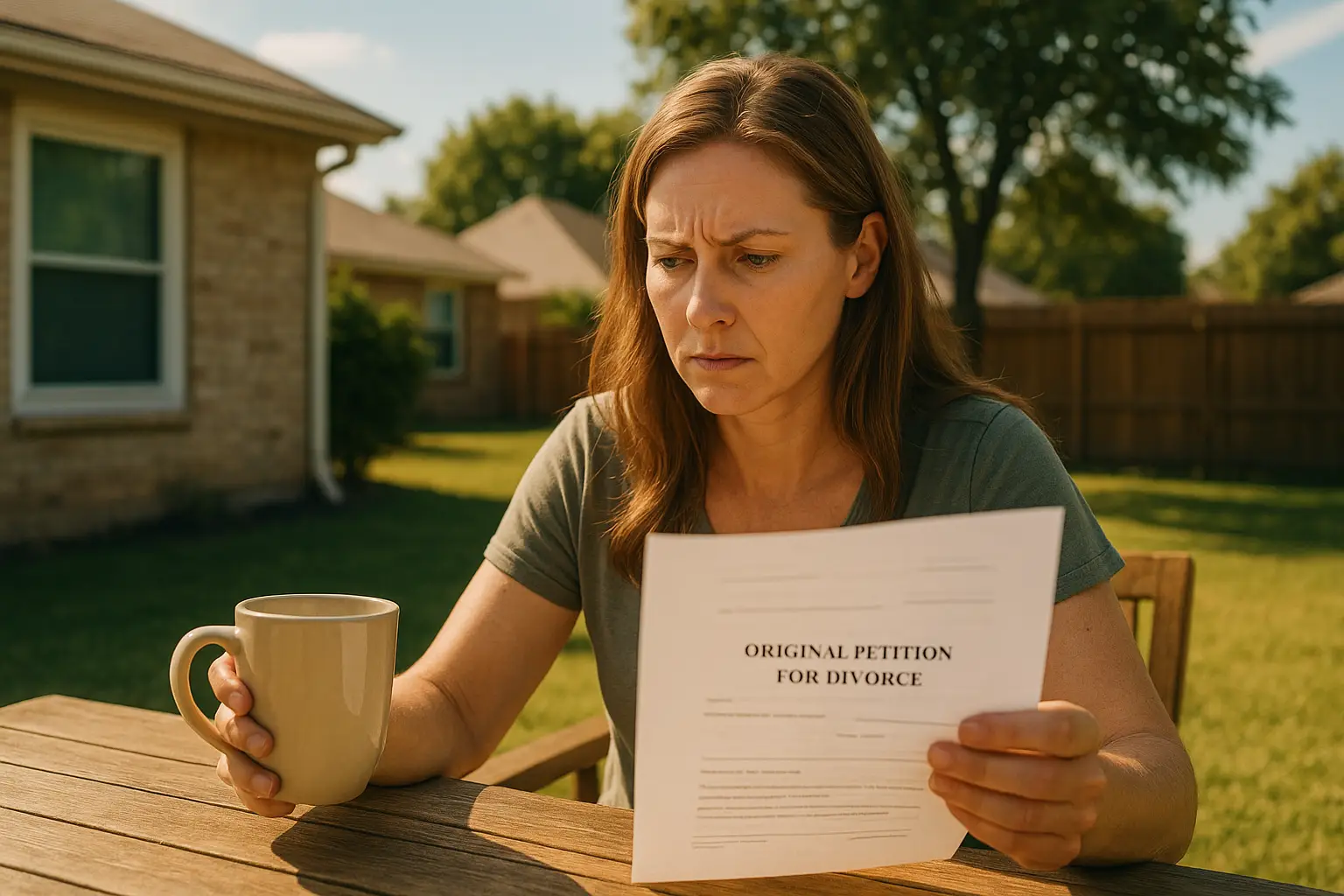
Ever tried helping your kid with math homework while simultaneously decoding a text from your ex about pickup schedules—and thought, “There’s got to be a better way to do this”? Yeah, we’ve been there. Life as a divorced or divorcing parent is already complicated, but when one of you lives out of state and the other files for divorce in Texas? Things can get legally sticky fast. That’s where the Texas Divorce special appearance comes in—it’s a powerful legal tool that lets you challenge whether Texas even has the right to drag you into court, without accidentally giving it permission to do just that.
If you’re a parent navigating divorce across state lines, this article is for you. You’ll learn why jurisdiction matters more than most people realize—especially when it comes to your child’s school life, mental health, and long-term success. We’re breaking down what a special appearance is, how to use it correctly (because timing is everything), and how courts weigh academic stability when deciding custody.
We’ll also share real-world scenarios, legal insights most people miss, and practical tips you can start using today—like how to work with your child’s school, how to build routines across two homes, and when to ask for tutoring or therapy support. At The Law Office of Bryan Fagan, PLLC, we’re here to educate families and protect futures—and that includes your child’s future in the classroom. Keep reading, because this might just be the legal clarity and emotional reassurance you’ve been looking for.
Key Takeaways
- A Texas Divorce Special Appearance allows nonresident spouses to contest personal jurisdiction without submitting to Texas courts, safeguarding their constitutional rights.
- Understanding the Texas Long-Arm Statute and relevant family law provisions is crucial for establishing or contesting jurisdiction in divorce cases.
- Failing to timely challenge jurisdiction can lead to the court assuming authority by default, resulting in binding decisions that adversely affect the nonresident spouse’s legal rights.

Your Family’s Future Starts Here
Don’t navigate your legal journey alone. Schedule a consultation now and get the clarity and support you deserve.
What is a Texas Divorce Special Appearance?
A Texas Divorce Special Appearance is a crucial legal tool that empowers nonresident spouses to contest a Texas court’s jurisdiction without inadvertently consenting to its authority, as outlined under Texas Rule of Civil Procedure 120a. According to our family law team, this mechanism aligns closely with Section 6.305 of the Texas Family Code, which addresses jurisdiction over nonresidents and underscores the state’s commitment to fair and just proceedings. Recent updates to the Texas Family Code reinforce the importance of ensuring that courts do not overstep their authority, especially when dealing with nonresident parties who lack sufficient connections to Texas.
Challenging personal jurisdiction is a critical first step in protecting your constitutional rights during a divorce. Nonresident spouses can assert this challenge through a Texas Divorce Special Appearance, thereby preventing the court from asserting power it may not lawfully possess. This proactive step helps safeguard your legal interests and avoids being subject to a Texas court’s orders without the proper jurisdictional foundation. As we’ve seen in our work with Texas families, failing to raise this issue at the outset can result in an unintended waiver of the right to contest, potentially subjecting you to unfair or burdensome court decisions.
Our legal professionals have helped many clients understand the nuances of filing a special appearance and how it fits within the broader divorce process. Filing a special appearance must be the first action taken in your divorce case—before any other filings or motions—to preserve your right to contest jurisdiction. For more detailed guidance on how to navigate this process and to learn about the latest updates to the Texas Family Code, we recommend reviewing our comprehensive article: Navigating Texas Divorce: Challenging Personal Jurisdiction Explained.
At The Law Office of Bryan Fagan, PLLC, we are dedicated to educating families and protecting futures. For further insight into protecting your rights during a Texas divorce, explore our helpful guide on jurisdictional considerations in Texas divorce. Our attorneys are here to help you navigate the complexities of family law with compassion and experience.

Legal Framework for Special Appearances
Personal jurisdiction determines whether Texas courts can assert authority over an out of state spouse in divorce matters. The Texas Long-Arm Statute plays a pivotal role in this determination, allowing Texas courts to assert jurisdiction over non-residents under specific conditions, such as:
- If a non-resident spouse maintains property in Texas
- If a non-resident spouse has shared financial accounts in Texas
- If the couple’s last marital residence was in Texas These factors can establish personal jurisdiction texas. Additionally, non resident spouses may also be affected by these jurisdictional rules.
Additionally, the Texas Family Code 6.305 permits Texas courts to adjudicate marital property located within the state, further supporting jurisdictional claims. Referencing these legal provisions helps build a robust understanding of how personal jurisdiction is established and contested in Texas divorce cases. Demonstrating legal expertise through accurate references to the Texas Family Code and the Texas Rules of Civil Procedure is essential in building credibility and ensuring a fair legal process, as it reflects the Texas court’s authority.
Familiarity with the legal framework for special appearances is crucial for navigating jurisdictional challenges in Texas divorce cases. Knowing the relevant statutes and legal principles enables individuals to effectively contest jurisdiction and protect their rights during divorce proceedings. This knowledge serves as the foundation for the practical steps and considerations outlined in the following sections.
Steps to Challenge Personal Jurisdiction in Texas Divorce Cases
Challenging personal jurisdiction in a Texas divorce case requires a strategic approach, starting with a thorough understanding of the legal process. To ensure that As our attorneys frequently advise, preserving your right to challenge jurisdiction in a Texas divorce case begins with addressing the issue of personal jurisdiction at the earliest opportunity. According to Section 6.305 of the Texas Family Code, a Texas court may exercise jurisdiction over a nonresident spouse only under certain conditions, such as significant ties to the state or substantial presence. Recent updates to the Texas Family Code have clarified the importance of adhering strictly to these jurisdictional requirements to ensure fair proceedings.
Failing to challenge personal jurisdiction promptly can result in an unintended waiver of your right to contest it later, potentially subjecting you to a court’s authority that may lack proper jurisdiction. This is why filing a Texas Divorce special appearance is critical as the initial action in your divorce petition. By filing this motion in compliance with Texas Rule of Civil Procedure 120a, you assert your challenge to the court’s jurisdiction without inadvertently submitting to it. This procedural safeguard is essential in protecting your constitutional rights and ensuring that your case proceeds in the proper forum.
Timing and procedural details matter significantly. Filing a Texas Divorce special appearance at the right stage preserves your right to contest jurisdiction and ensures that your legal arguments are considered by the court. As we’ve seen in our work with Texas families, a well-prepared special appearance can mean the difference between a fair hearing and being bound by a court’s ruling that may not have authority over your case. For a deeper exploration of when a Texas divorce court may lose jurisdiction—and how that affects your case—please refer to our detailed guide: When Does a Texas Divorce Court Lose Jurisdiction?.
At The Law Office of Bryan Fagan, PLLC, our legal professionals have helped many clients understand the nuances of jurisdictional challenges. For more insights on protecting your rights in a Texas divorce, visit our helpful resource on Texas Divorce Jurisdiction and Venue. Our mission is to educate families and protect futures, guiding you every step of the way through this complex legal process.

Filing a Special Appearance
Filing a special appearance is the first and most crucial step in challenging personal jurisdiction in a Texas divorce case. This action must be taken at the outset of the divorce proceedings to maintain the right to contest the court’s jurisdiction. Filing a special appearance challenges the court’s personal jurisdiction without submitting to it, ensuring that your rights are protected from the beginning.
Proper documentation is essential when filing a special appearance. Evidence of your connections to Texas can help establish whether the court has the authority to assert jurisdiction over you. Such evidence includes:
- Lease agreements
- Utility bills
- Other relevant legal documents. Accurately presenting this documentation is crucial in building a strong case against improper jurisdiction.
Engaging legal counsel can significantly enhance your ability to navigate this process effectively. Experienced attorneys can provide tailored legal strategy to address specific jurisdictional issues in your divorce case. Their expertise in handling similar cases and understanding the nuances of Texas law can make a substantial difference in the outcome of your jurisdictional challenge, especially when supported by a strong legal team.
Timing and Procedural Considerations
Timing is of the essence when challenging personal jurisdiction in a Texas divorce case:
- A special appearance must be raised before any other pleadings to avoid waiving jurisdictional objections.
- Filing this challenge promptly ensures that the court addresses the objection before proceeding with the case.
- This prevents unnecessary delays or dismissals.
Real-life cases frequently highlight the importance of addressing jurisdictional issues early in the divorce process. Delaying the filing of a special appearance can lead to complications and increase legal costs, as the court may proceed without considering the jurisdictional challenge. Therefore, it is crucial to act swiftly and decisively to protect your rights.
Experienced legal counsel plays a vital role in navigating the procedural nuances of jurisdictional hearings. Attorneys familiar with the procedural rules can help present your case effectively, ensuring that your jurisdictional challenge is heard and addressed appropriately. Their expertise can prevent costly mistakes and ensure a fair legal process while adhering to legal procedures.
Common Scenarios for Special Appearances
As our attorneys frequently advise, there are several common scenarios that warrant the filing of a Texas Divorce special appearance in order to challenge a court’s personal jurisdiction. According to Section 6.305 of the Texas Family Code, a Texas court may only exercise jurisdiction over a nonresident spouse if certain requirements are met—such as significant ties to the state or meaningful contacts that justify the court’s authority. Recent updates to the Texas Family Code continue to emphasize the importance of ensuring that jurisdiction is based on substantial connections rather than incidental or tangential contacts.
For example, out-of-state defendants—including parents who reside elsewhere—often seek to challenge jurisdiction if they do not conduct business, own property, or have significant ongoing ties to Texas. If a defendant resides in a different state and lacks meaningful engagement with Texas, they may contest the court’s authority to hear their case. Even minimal contacts, such as sporadic online interactions or contracts not performed in Texas, can be grounds for challenging jurisdiction, ensuring that individuals are not unfairly subjected to a Texas court’s orders.
Defendants facing tort claims for incidents that occurred entirely outside of Texas, or who lack substantial business or personal ties to the state, may also file a Texas Divorce special appearance to contest jurisdiction. These scenarios illustrate the critical importance of understanding personal jurisdiction and the various factors that can influence a court’s authority to proceed with a divorce case. As we’ve seen in our work with Texas families, recognizing these situations empowers clients to challenge jurisdiction effectively and safeguard their rights. Additionally, understanding subject matter jurisdiction is essential, as it defines the types of cases a court can hear and reinforces the court’s overall authority under Texas law.
Our legal professionals have helped many clients understand the steps involved in contesting jurisdiction and how to navigate these challenges with confidence. To learn more about what judges consider at the first court date in a Texas divorce, and to ensure you’re prepared for every step of the process, visit our comprehensive resource: What Judges Look for on the First Court Date for Divorce in Texas. For additional guidance on this and related topics, check out our in-depth article on jurisdiction and venue considerations in Texas divorce cases. At The Law Office of Bryan Fagan, PLLC, we are dedicated to educating families and protecting futures every step of the way.

Risks of Failing to Contest Jurisdiction
As our attorneys frequently advise, failing to contest jurisdiction in a Texas divorce case can have profound legal consequences. Under Section 6.305 of the Texas Family Code, a Texas court may assume jurisdiction over a nonresident spouse only if specific requirements are met, including substantial ties to the state. Recent updates to the Texas Family Code continue to reinforce the importance of jurisdictional challenges, emphasizing the need to protect out-of-state spouses’ rights and ensure that proceedings are conducted fairly and lawfully.
If a Texas Divorce special appearance is not filed properly, the court may assert jurisdiction by default, effectively binding the nonresident spouse to its decisions—even if those decisions may not be enforceable outside of Texas. This scenario can complicate matters such as property division, child custody, and support obligations, potentially leading to outcomes that fail to align with the best interests of the parties involved. Additionally, jurisdictional errors can affect the court’s authority to make binding decisions on child custody and support, as governed by the Uniform Child Custody Jurisdiction and Enforcement Act (UCCJEA), which Texas has adopted to clarify and standardize child custody determinations.
As we’ve seen in our work with Texas families, failing to properly contest jurisdiction can also cause significant delays, increasing legal costs and prolonging the resolution of the divorce. Filing for divorce in the wrong court can add layers of complexity and result in further procedural hurdles, highlighting the importance of raising jurisdictional objections at the outset. By filing a Texas Divorce special appearance as the initial action in your case, you preserve your right to challenge the court’s authority without inadvertently consenting to its jurisdiction, ensuring that your legal rights are fully protected.
Our legal professionals have helped many clients understand the crucial steps to preserve their rights and challenge jurisdiction effectively. For more insight into your rights as an out-of-state spouse and how to navigate jurisdictional objections in Texas divorce cases, explore our detailed resource: Texas Divorce Out-of-State Spouse Rights and Objections Explained. Additionally, we invite you to read our informative guide on challenging jurisdiction and venue in Texas divorce. At The Law Office of Bryan Fagan, PLLC, we are dedicated to educating families and protecting futures, ensuring that every client feels empowered and informed throughout their legal journey.

Real-World Applications and Case Studies
According to our family law team, real-world applications and case studies underscore the critical importance of challenging personal jurisdiction in Texas divorce cases. Under Section 6.305 of the Texas Family Code, a Texas court can only assert jurisdiction over a nonresident spouse if specific conditions are met—such as significant ties to the state. Recent updates to the Texas Family Code have reaffirmed the importance of establishing proper jurisdiction before proceeding with a divorce case, reinforcing the need for a proactive legal strategy.
Our legal professionals have helped many clients understand how a Texas Divorce special appearance can safeguard their rights by contesting the court’s authority at the outset. For example, one notable case handled by our firm involved a complex jurisdictional challenge where our attorneys successfully argued that the court lacked the necessary authority to proceed, resulting in a favorable outcome for the client. This case highlights how critical it is to raise jurisdictional objections early in the process, ensuring that the correct court hears your case and that your rights are fully protected.
As we’ve seen in our work with Texas families, jurisdictional challenges often intersect with other legal procedures, including Rule 11 Agreements, which can formalize agreements between parties without waiving important rights. For a deeper understanding of how Rule 11 Agreements can support your divorce strategy, we recommend reviewing our comprehensive resource: What is a Rule 11 Agreement in Texas Divorce Cases?. These agreements can be especially helpful in managing complex jurisdictional issues while protecting your interests throughout the divorce process.
At The Law Office of Bryan Fagan, PLLC, we pride ourselves on educating families and protecting futures. Our extensive experience handling jurisdictional challenges in Texas divorce cases demonstrates our commitment to ensuring that every client’s rights are upheld in accordance with the latest legal developments. For additional insights, visit our article on navigating jurisdictional considerations in Texas divorce.

Consulting with Experienced Legal Counsel
Working with experienced legal counsel is essential when challenging personal jurisdiction in a Texas divorce case. Qualified attorneys can guide you through the complexities of the legal process, ensuring compliance with jurisdictional laws and preventing costly mistakes. This expertise is particularly important for out-of-state spouses facing jurisdictional challenges and can help exercise personal jurisdiction effectively. Understanding how personal jurisdiction works can further enhance your legal strategy.
Engaging a knowledgeable attorney can make a significant difference in the outcome of your jurisdictional hearing. Experienced legal counsel can navigate procedural nuances and help present your case effectively, ensuring that your objections are heard and addressed appropriately. Their support can provide peace of mind and increase the likelihood of a favorable resolution.
If you are facing a jurisdictional challenge in your Texas divorce case, contact the Law Office of Bryan Fagan, PLLC for a confidential consultation. Their experienced family law team can provide the guidance and support you need to navigate this complex legal landscape and protect your rights throughout the divorce proceedings involving texas divorces.

Building Authority and Trust in Family Law
Bryan Fagan has developed a reputation for innovative legal strategies that effectively address the needs of families facing divorce issues. The firm’s commitment to ongoing education ensures that they remain updated on the latest developments in family law, providing clients with cutting-edge legal representation.
The Law Office of Bryan Fagan, PLLC offers a comprehensive approach to family law, including services in custody, property disputes, and mediation. This dedication to addressing all aspects of a family law case enhances their authority in the Texas legal landscape.
Establishing the Law Office of Bryan Fagan, PLLC as a leading voice in Texas divorce litigation builds trust and confidence among clients facing complex divorce proceedings. Their extensive experience and commitment to excellence make them a reliable partner in navigating the challenges of family law.
Conclusion:
Navigating divorce is tough—especially when it involves questions about where your case should even be heard. But here’s the good news: you don’t have to figure it all out alone. Understanding tools like a Texas Divorce special appearance isn’t just about legal maneuvering—it’s about protecting your rights, your time, and most importantly, your child’s stability in the classroom and beyond.
If today’s read gave you a bit more clarity, that’s exactly why we’re here. Whether you’re staring down confusing court papers or trying to make sure your child doesn’t miss another homework assignment during a custody exchange, we’re ready to help you build a strategy that works—for your legal needs and your family life.
Every case is different, and the right guidance early on can make all the difference. If you’re unsure whether Texas should have jurisdiction, or just want to make sure your child’s academic path stays steady through the ups and downs of divorce, reach out. At The Law Office of Bryan Fagan, PLLC, we combine legal knowledge with heart—because protecting your family’s future means looking at the big picture, not just the case number.
And if you’re still wondering whether that Wednesday spelling test matters in the courtroom—trust us, it just might. Let’s talk.
Frequently Asked Questions About Texas Divorce
What is the difference between a general appearance and a special appearance?
A general appearance means the party is voluntarily submitting to the court’s jurisdiction, often by filing an answer or motion. A special appearance, however, is filed specifically to challenge the court’s jurisdiction without waiving that challenge by appearing in court.
What is the 10 year rule in divorce in Texas?
The 10-year rule in Texas divorce refers to eligibility for spousal maintenance. If a marriage lasted 10 years or more, a spouse may qualify for maintenance if they lack sufficient property or income to meet basic needs and meet other legal criteria.
What is an example of a special appearance?
An example of a special appearance is when a nonresident spouse receives divorce papers filed in Texas and responds only to challenge the court’s jurisdiction, without addressing the substance of the case.
What does special appearance mean?
A special appearance is a legal filing made solely to contest a court’s personal jurisdiction over the party, ensuring they do not waive that objection by participating in the case.
What is a special appearance in Texas?
In Texas, a special appearance under Rule 120a of the Texas Rules of Civil Procedure allows a party—typically a nonresident—to challenge the court’s jurisdiction without submitting to it. It must be the first thing filed in the case.
What is the rule of appearance?
The rule of appearance refers to the legal principle that a party who makes a general appearance before a court waives any objection to the court’s jurisdiction, unless a special appearance is properly made first.
What is Rule 11 in Texas divorce?
Rule 11 of the Texas Rules of Civil Procedure allows parties in a divorce to enter written agreements that are filed with the court or made in open court and recorded. These agreements can address temporary orders, property division, custody, or support.
Does length of marriage affect divorce settlement in Texas?
Yes, the length of the marriage can influence factors like spousal maintenance, property division, and retirement benefits. Longer marriages may result in a greater entitlement to long-term support or a larger share of community property.
What is a wife entitled to after 20 years of marriage?
After 20 years of marriage in Texas, a wife may be entitled to spousal maintenance, a fair share of community property, retirement accounts, and potentially continued health insurance coverage depending on the circumstances.








